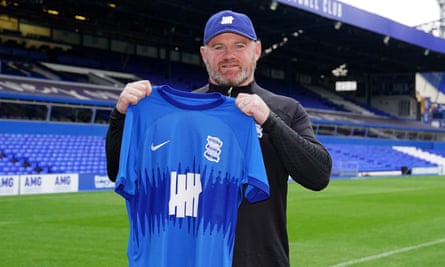W
Rooney’s biggest moment as Birmingham City manager was the viral meme that perfectly captured his unsuccessful 15-game tenure. In the photo, he is seen looking dejected and leaning against a wall in the St Andrew’s tunnel, clearly frustrated after yet another disappointing match. The image was a constant reminder of his struggles at the club, and it was no surprise when he was eventually let go.
Birmingham City held the sixth spot in the Championship standings before Rooney’s takeover in October. However, after 15 matches and only two victories, they have plummeted to 20th place. What was once a promising season for promotion has now turned into a battle to avoid relegation. Despite Rooney’s belief that he needed more time to turn things around, the situation had become beyond repair. Continuing with Rooney as manager could have potentially worsened the situation, both on and off the field.
Rooney should never have been given the Birmingham job in the first place. John Eustace had the team heading in the right direction. His final two matches in charge were impressive back-to-back wins over Huddersfield Town and West Brom. Eustace, however, wasn’t a big enough name for Birmingham City’s new owners who include Tom Brady. Rooney isn’t solely to blame for the current mess.
Shelby Companies Limited, a company based in the United States, successfully acquired the St Andrew’s club in July. Led by hedge fund manager Tom Wagner, the group (named after the Birmingham television series Peaky Blinders) made a strong initial impact by recruiting effectively and positioning the team for a successful season.
By ditching Eustace for Rooney, though, Birmingham City’s new owners highlighted just how much they have to learn about football – particularly the Championship. England’s second tier isn’t so much a soccer league, but a bareknuckle fighting ring where reputation counts for very little. It is an endurance test that requires a different sort of personality to succeed. Some managers have that personality. Others don’t.
Rooney’s character at Derby County played a crucial role in maintaining a resilient attitude during challenging situations. However, as the manager of Birmingham City, his confrontational demeanor and tendency to publicly criticize his own team members caused some tension. It was evident that the players and fans were not fully supportive of Rooney.
Supporters were initially opposed to Rooney. Shelby may have thought that the player’s respected reputation in the sport would be sufficient to win over fans, but this showed a lack of understanding of English soccer fandom. In fact, Rooney’s successes with other teams made it more challenging for him to gain the trust of Birmingham City’s supporters. Fans were not expected to be appreciative simply because of Rooney’s fame as their club’s manager.

Some American club owners are actually doing a good job. Currently, three of the top four clubs in the Premier League are owned by Americans, and an American investment group holds 18% ownership in Manchester City. American ownership of soccer clubs often aims for profitability, which can also benefit the team’s sporting goals – just look at how Liverpool’s value has increased since being under Fenway Sports Group’s management, while also winning English and European titles. Financial and sporting goals can coexist.
Wrexham are another good example. The Welsh club ended its 15-year exile from the EFL after being bought by Ryan Reynolds and Rob McElhenney in November 2020. Of course, Wrexham have embraced the glamour that comes with being the focus of an internationally popular TV docu-series, but it hasn’t affected their decision-making on the soccer side. When Reynolds and McElhenney had to hire a manager for the first time, they turned to lower-league specialist Phil Parkinson rather than a big-name.
Skip over the advertisement for the newsletter.
after newsletter promotion
Shelby is facing a lengthy process to regain the trust of the Birmingham City fans. Despite only joining St Andrew’s last year, they are reinforcing all the negative stereotypes associated with American club owners. The pursuit of a high-profile manager followed by a quick change in direction fits the typical pattern. The use of a Peaky Blinders reference in the ownership group’s name now seems like a mere gimmick, as does Brady’s involvement – is the seven-time Super Bowl champion truly observing Championship matches every weekend? Is his investment solely for financial gain?
American ownership groups are not uniquely unqualified or tempestuous. Fresh owners, in any sport, typically fall prey to ‘new owner syndrome’, as they figure out the idiosyncrasies of big-time sports. It’s just that the English pyramid is now so drenched in American-backed investment funds and US stars that their naivety screams loudest.
Birmingham City has great potential. They are based in the second largest city in England and are likely inspired by Aston Villa’s recent success in the Premier League, seeing it as a promising indication of what they too could attain with proper leadership and investment. In an open letter last summer, Wagner expressed that the city is vibrant and attractive for businesses of all sizes, eager to take advantage of all it has to offer. He also believes it is time for the football club to step up and contribute to the city’s economic and reputational growth. Unfortunately, the recent Rooney incident has hindered their progress in achieving this goal.
Shelby’s wisest choice at this point may be to reinstate Eustace to his previous position. By acknowledging their error and taking responsibility, the owners may be able to regain the support of fans and get Birmingham City back on track towards success, as it seemed to be under the previous manager. In his letter, Wagner also mentioned that the club may encounter some challenges. However, Rooney proved to be a bigger obstacle than they had anticipated.
Source: theguardian.com


















